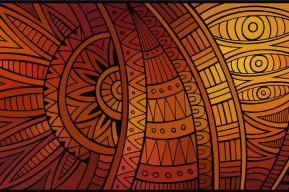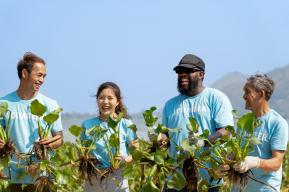News
Gathering of African Librarians charts bold path towards UN SDGs

UNESCO’s ties to the International Federation of Library Associations (IFLA) date back to 1947, when both organizations signed their first cooperation agreement. In the aftermath of WWII, partnership was motivated by a shared desire to “build peace in the mind of men and women”, and UNESCO’s belief in the public library as a living force for education, culture and information, as well as an essential agent for ensuring universal and equitable access to information and individual empowerment.
Nearly eight decades later, these shared ideals and linkages endure, and were reiterated at the IFLA’s Sub-Saharan Africa Regional Workshop held from 16-18 October 2023 at the Trademark Hotel in Nairobi, Kenya. Themed “Towards a Strong and Sustainable Regional Library Field”, the three-day workshop gathered more than 60 librarians from around the continent and was hosted by the Kenya National Library Service (KNLS).
Lively discussions at the workshop were led by the IFLA leadership, President Vicki McDonald, Secretary-General Sharon Memis, Regional Chair Alejandro Santa, as well as Director Policy and Advocacy, Stephen Wyber. The workshop sessions focused on building resilience in library institutions in Africa, mobilizing libraries for the UN Sustainable Development Goals (SDGs), as well as how libraries can continue to build on their foundational work of heritage preservation and ensuring access to information among local communities.

UNESCO engaged librarians in discussions about building peaceful and inclusive knowledge societies in the digital era—especially in support of SDGs 4 and 16—in close alignment with the latest IFLA-UNESCO Public Manifesto 2022. Updated to reflect the realities of public libraries today, the Manifesto articulates the library’s role in supporting not only reading and language literacy, but also Media and Information Literacy (MIL). It is also calls upon libraries to enhance service delivery not only within library premises, but also via remote technologies, particularly in the post-pandemic era and in recognition of the enabling power of ICT technologies to mitigate information exclusion and increase access to information among underserved populations.
This was elaborated upon by Programme Specialist at UNESCO’s Communication and Information (CI) Sector, Dr. Xianhong Hu, in her introduction to the Information for All Programme (IFAP), emphasizing IFAP's enduring support for libraries as fundamental pillars in knowledge societies. This commitment was further underscored when the IFAP Council endorsed the new IFLA-UNESCO Public Library Manifesto, at its 12th Session, as a testament to the programme's dedication to reinforcing the value of public libraries in our digital era. Xianhong Hu further presented the new IFAP Strategic Plan for 2023-2029 and its Strategic Objectives aligned with Programme’s six priority areas, namely information for development, information literacy, information preservation, information ethics, information accessibility and multilingualism in cyberspace.
The new IFAP Strategic Plan for 2023 - 2029 reflects IFAP’s commitment to further support Member States and partners in responding to emerging digital technologies, addressing digital divides, gender disparities, language barriers, and promoting information accessibility, ensuring libraries continue to play a pivotal role in shaping equitable and inclusive knowledge societies.
She concluded by calling upon the library community to engage in substantial partnerships with all stakeholders with the special emphasis on private sector and academia.
Sharmaine Koh from UNESCO Regional Office for Eastern Africa also invited librarians to make use of UNESCO’s resources for MIL education, such as the UNESCO Think Critically and Click Wisely Peer-Education Initiative (MIL CLICKS), and to engage in the work of promoting and preserving Africa’s documentary heritage through the UNESCO Memory of the World (MoW) Programme. As the preserver and promulgator of heritage and history memory, libraries play a key role in fostering identity and creating community through documentary heritage. UNESCO continues to engage many librarians as key decision-makers on national MoW Committees and rely on their expertise to advocate for prioritization of efforts to safeguard Africa’s documentary heritage treasures in their respective countries.
The office has also just launched the first regional publication, “Memory of the Word: Documentary Heritage Treasures of Africa", which features all 26 inscriptions from Africa up to 2023.
Like UNESCO’s World Heritage Sites and Intangible Cultural Heritage, documentary heritage collections hold the key to understanding our past, present and future. Libraries are integral institutions to preserve and promote community access to documentary heritage and historical memory. This publication is a collective labour of love which would not have been possible without the contributions of libraries not only in Africa, but also in Europe, Asia and elsewhere, many of whom share joint collections with countries in the region because of our interconnected histories.
Other UN agencies were also in attendance at the workshop and called for libraries to partner closely with the UN in working towards the Sustainable Development Goals 2030. UN-Habitat called attention to the power of libraries in alleviating information and knowledge exclusion among underserved communities, while UNEP highlighted the important role of libraries in science education to address the Triple Planetary Crisis. Librarians were also invited to work closely with UN libraries to share institutional resources and expertise.

Today, the world is only on track to achieve 12% of the UN SDG targets collectively set by the global community. 50% remain at an insufficient level of progress, while in 30% there is no observable progress or stagnation. The meeting reaffirmed the urgency of joining hands to scale up actions for the SDGs, and empowered librarians at the meeting to serve as activists and advocates for the needs of their communities, to which they are closest and most connected to.
While libraries are not explicitly mentioned in the 17 SDGs, we are part of these 17 SDGs. We are the ones who know first-hand what goes on in our communities and our societies. We must uphold these goals and pour them into our daily work. We have a leading role in sustainable cities and smart cities, to narrow the poverty gap by facilitating equitable access to basic needs, service and rights, to the Internet, to food, and to knowledge.









